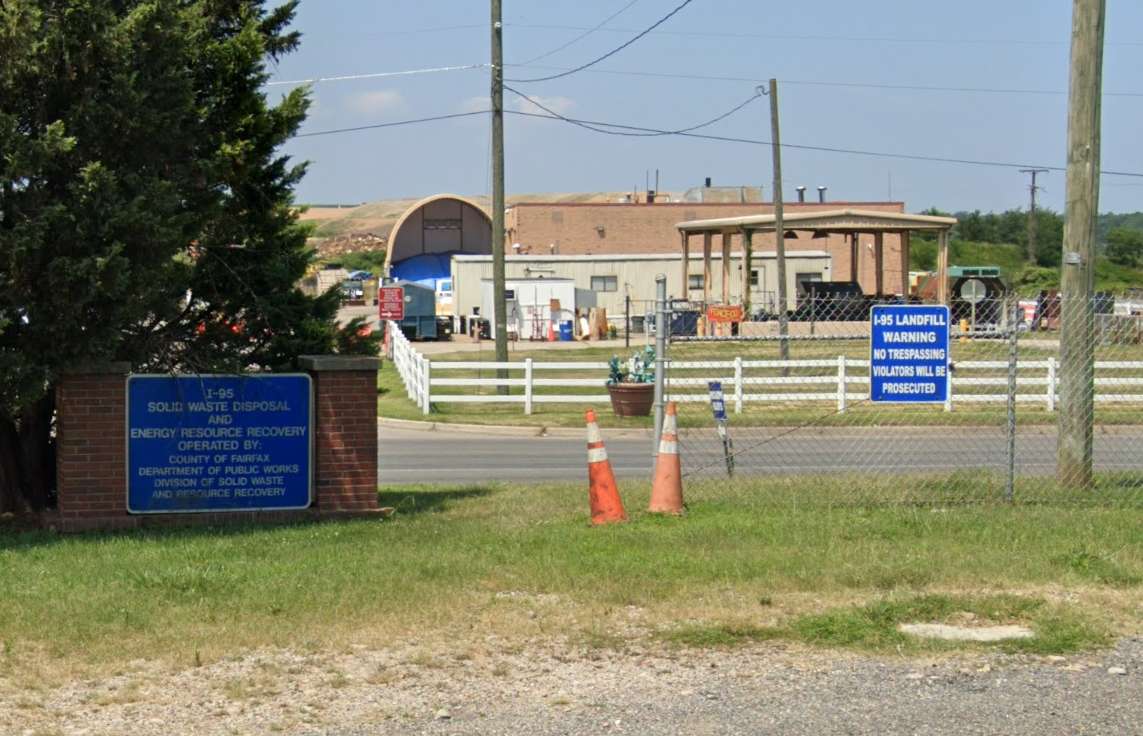
(Updated at 5:05 p.m. on 2/29/2024) Fairfax County’s supervisors believe that grassland birds deserve a safe nesting ground, even if it’s atop a former landfill.
The Board of Supervisors directed county staff on Feb. 20 to work with the Virginia Department of Environmental Quality (DEQ) and the Audubon Society of Northern Virginia to identify areas within the I-95 Landfill Complex (9850 Furnace Road) in Lorton where mowing can be minimized to protect grassland birds during their nesting season.
Though the facility still provides waste disposal services, most of the landfill closed around the late 1980s to early 1990s, according to Mount Vernon District Supervisor Dan Storck’s office.
Since then, the site has become a habitat for 100 species of grassland birds, including grasshopper sparrows, eastern meadowlarks, bobolinks and American kestrels.
“These are all birds of concern because of declining grassland habitats,” Greg Butcher, the former director of bird conservation for the Audubon Society of Northern Virginia, told FFXnow in an email.
The Fairfax County Department of Public Works and Environmental Services (DPWES) currently has an agreement with the Audubon Society to permit bird monitoring at the landfill.
Recently, the environmental organization reached out to the board, urging the county to consider restrictions on mowing during the nesting season, from April 1 to mid-July, due to its potential to destroy nests and eggs and harm fledglings and adult birds.
However, since federal and state regulations require mowing for post-closure maintenance of the landfill, DPWES and the Audubon Society must collaborate with DEQ to devise a strategy that both preserves nesting birds and ensures access to the landfill cover and gas wells, while also maintaining proper drainage.
Representatives from DPWES and the Audubon Society are set to start discussions soon and aim to formulate a plan in the upcoming weeks, DPWES Deputy Director Eric Forbes told FFXnow in an email.
“We are anticipating about a month for the development and coordination of the pilot plan to try to be ready for this season’s bird nesting,” he said. “The pilot plan would include a map showing no mow areas, access pathways to our landfill infrastructure (gas wells and stormwater conveyance), and a schedule for mowing in non-peak nesting season.”
For its part, the Audubon Society plans to send volunteers to map the locations of the birds and their potential nesting areas, Butcher says. But he noted the organization doesn’t know yet how big the “no-mow” area will need to be.
It’s also unclear how much the project will cost, but the board asked staff to provide an estimate in a report.
The county’s future plans for the now-closed parts of the I-95 landfill include a solar panel array and a potential indoor skiing facility from the Tysons-based company Alpine-X.
In addition, a public park with trails, an amphitheater and other amenities is being developed on the former Lorton Landfill across the street at 10001 Furnace Road. Owned by Furnace Associates, Inc., the private landfill stopped accepting construction and demolition debris in 2018 and completed the closure process in 2021.
Correction: This story originally conflated the I-95 Landfill Complex with the privately owned Lorton Landfill. It has been updated to clarify that the two sites are different. Image via Google Maps
(Updated at 3:55 p.m.) A local bald eagle stretched its wings for the first time in over a month when it got released at Burke Lake Park this past weekend.
The adult, male bird was found in Fairfax Station on Dec. 23 by Fairfax County Animal Protection Police officers, who were responding to a call for service. In addition to being “underweight,” the eagle had head injuries and “a deep laceration on a leg,” according to the Fairfax County Police Department.
“The exact cause of the eagle’s injury remains unknown, but it is common for wildlife in urban areas to sustain injuries from various factors,” an FCPD spokesperson told FFXnow.
After managing to capture the eagle, the responding officers enlisted the assistance of Wildlife Rescue League volunteers, who transported it to Wildlife Veterinary Care in Boyce, Virginia. Led by veterinarian Dr. Belinda Burwell, the clinic provides free veterinary and rehabilitation services for sick and injured native wildlife.
According to the FCPD, Burwell specializes in treating raptors, but Wildlife Veterinary Care can take care of more than 200 different species of animals, per its website.
Burwell released the bald eagle at Burke Lake Park (7315 Ox Road) on Sunday, Feb. 4 after it spent six weeks in treatment and recovery, the FCPD said. Animal Protection Police officers, Wildlife Rescue League volunteers and park staff all attended the release.
Encompassing 888 acres of water and woodland, Burke Lake Park is an “ideal habitat” for eagles and other large birds, according to the police department’s media team.
“The park offers a suitable environment with abundant food sources and minimal human interference, providing the eagle with the best chance of thriving after its rehabilitation,” the FCPD said.
This isn’t the first time local police have worked with Burwell to rehabilitate a bald eagle.
She previously helped care for a bird suffering from an injured shoulder and lead poisoning that a community member had encountered on a trail near Burke Lake in December 2019. That eagle was also released at Burke Lake Park on Jan. 12, 2020, an occasion that drew over 500 onlookers, the Fairfax County Park Authority said at the time.
Burwell told the Washington Post that lead poisoning is a common issue in the five to 10 eagles that Wildlife Veterinary Care typically sees each year. Raptors are often exposed to lead when they eat the remains of animals shot by hunters, according to the Wildlife Center of Virginia, which admitted over 60 bald eagles last year — the most in one year since its founding in 1982.
The Wildlife Rescue League’s helpline, which is entirely supported by volunteers and donations, received 6,500 calls for assistance last year, including 2,896 calls for sick, injured or orphaned birds, according to WRL President Beth Axelrod.
“Ten of those calls were about eagles, and four eagles were transported by WRL volunteer transporters,” Axelrod told FFXnow. “I believe three of them were Fairfax County, one was from Loudoun.”
Virginia once had just 30 breeding pairs of bald eagles, but the species has recovered nationally in recent decades, to the point where it was taken off the federal list of endangered species in 2013.
According to data gathered by the Center for Conservation Biology, most of Fairfax County’s recorded nests can be found in the southeast, particularly around Mason Neck, but there was one nest in Burke Lake Park counted in 2015. The county is also home to hawks and at least one family of falcons that regularly nests at Reston Town Center.
Work is underway to restore the waterways around the Fairfax County Government Center.
To support the Difficult Run stream restoration project, which began in October, the Fairfax County Department of Public Works and Environmental Services (DPWES) worked with a consultant to relocate over 200 fish and eels to the pond outside the Herrity Building (12055 Government Center Parkway).
In an approach that DPWES says is “unprecedented” for the county, the aquatic creatures were corralled using an electro-fishing boat provided by the consultant, Prince William County-based Solitude Lake Management.
A total of three eels, 49 bluegill and 145 golden shiners were moved on Dec. 5, making way for dredgings of the government center’s two amenity ponds.
“The American eel is actually an endangered species, so it’s especially good that we got them out,” Caleb Yankee, a fisheries biologist for Solitude Lake Management, said in a brief video shared by DPWES to showcase the relocation process.
According to Jonathan Witt, an ecologist in the department’s stormwater management division, electro-fishing involves electrifying the water “in the immediate vicinity” of the boat, stunning the fish and bringing them to the surface so they can be picked up in nets.
They were then put in a storage tank and transported to their new home less than a mile away.
DPWES emphasized that electro-shocking is a “sophisticated and humane technique that allows for efficient, safe fish relocation.” The county has utilized electro-shocking before, but on a smaller scale, using handheld devices instead of a full boat.
“The successful transfer of these aquatic residents to Herrity Pond signifies not only the protection of these species during the restoration project, but also the enrichment of the pond’s biodiversity,” DPWES said. “The fish have been carefully introduced into their revitalized habitat, marking a significant step towards ecological balance.”
In addition to dredging the ponds, the Difficult Run Tributary and Basins project entails restoring about 1,600 linear feet of stream, which will reduce soil erosion, shore up natural habitats on land and in the water and improve water quality, according to DPWES.
The northwestern portion of a trail on the government center campus recently reopened with the completion of the project’s first phase. Additional trail closures for the second and third phases are expected to start next week, according to DPWES spokesperson Sharon North.
“With the updated schedule, it could last [until] about May 2024,” North told FFXnow.
That would push back the end date for the fourth phase — which focuses on the streams and ponds along the property’s southeastern border — from September to November or December 2024.
After the project, the amenity ponds will be restocked with new native fish, DPWES says.
“Fairfax County residents are encouraged to participate in the final phase of the project, where they can witness the restocking of the amenity ponds,” the department said. “This event will offer a unique opportunity to observe the tangible impacts of such environmental initiatives.”
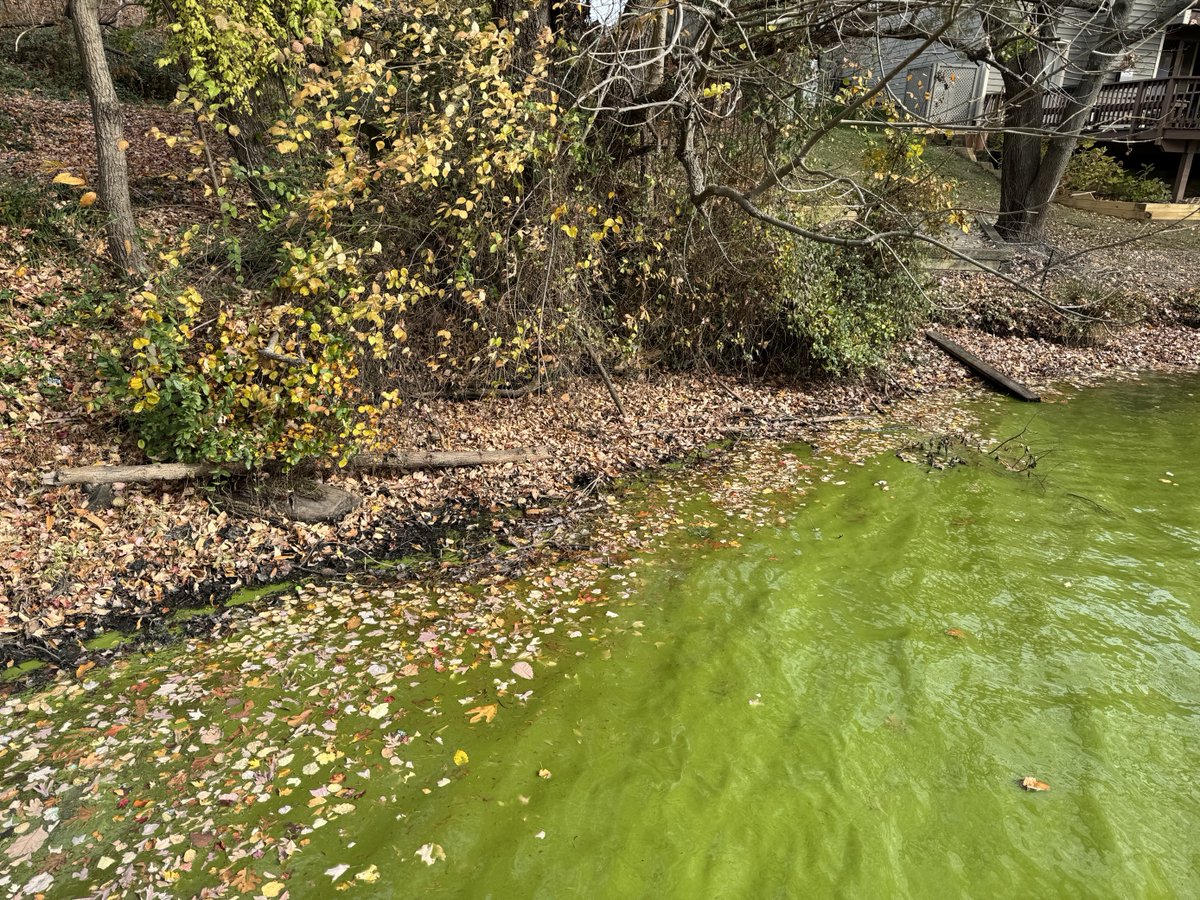
Updated at 3:40 p.m. — An algae bloom was spotted this morning in Lake Anne, joining blooms on Lake Thoreau and Lake Audubon, Reston Association says.
“At this time, Reston Association has determined that treatment of the blooms would not be beneficial, as a mass die-off of algae after treatment would cause a dip in otherwise healthy oxygen levels, therefore posing significant risk to fish and wildlife in the lake,” the organization said, advising residents and pets to avoid contact with the affected lakes.
Earlier: Reston Association plans to let algae blooms at Lake Thoreau and Lake Audubon run their natural course.
In response to concerns from the community about the blooms, RA said that treating them could disrupt oxygen levels in the lakes, putting fish and wildlife at risk.
“While we understand concerns about the algae bloom, especially this late in the season, our experts believe that leaving the bloom to run its course is more likely to result in a balanced outcome,” RA wrote in a statement on social media.
RA says it will continue to monitor the situation.
RA confirmed to FFXnow that the blooms are the same ones that emerged in mid-October. At the time, the scope of the bloom on Lake Thoreau was limited, but it contained potentially harmful cyanobacteria, leading RA to advise avoiding contact with the water.
“These blooms arrived quickly at the onset of fall turnover, which mobilizes nutrients from the bottom of the lake into the rest of the water column,” said Cara O’Donnell, RA’s director of communications and community engagement. “Typically, a fall turnover bloom like this would subside quickly, but we’ve had unseasonably warm weather this fall that is causing the bloom to linger longer than anticipated.”
Lake Audubon also had a bloom this summer that was cleared in August.
Our watershed team is closely monitoring the situation, and at this time they’ve chosen to hold off on a late-season treatment out of concern for the health of fish and wildlife in and around the lake. pic.twitter.com/h7VDn6TcIN
— Reston Association (@RestonOnline) November 15, 2023

The Fairfax County Park Authority is celebrating spooky season with a bat-focused festival next weekend.
The 2023 Bat Festival is scheduled for Sunday, Oct. 29, from 3-6 p.m. at the Wolf Trap National Park for the Performing Arts (1551 Trap Road).
Fairfax County is home to eight different species of bats, with big brown bats and Eastern red bats as the most commonly seen, according to the county’s wildlife management department.
“Come celebrate the captivating world of bats, learn about the vital role they play in our ecosystem, understand the threats they face and what you can do to protect them,” Fairfax County said in a release.
A pair of experts will be on hand to help “unveil the mysteries” behind the creature and talk about the challenges they face.
“Enjoy interactive activities for all ages and join our optional costume contest,” the event website said.
The educational tables and costume contest are scheduled for 3 p.m., followed by bat expert presentations at 4 p.m. and a bat listening demonstration at 5:30 p.m.
Guests are encouraged to bring picnic blankets, chairs, food and beverages. Registration is free online.
Photo via Clément Falize/Unsplash
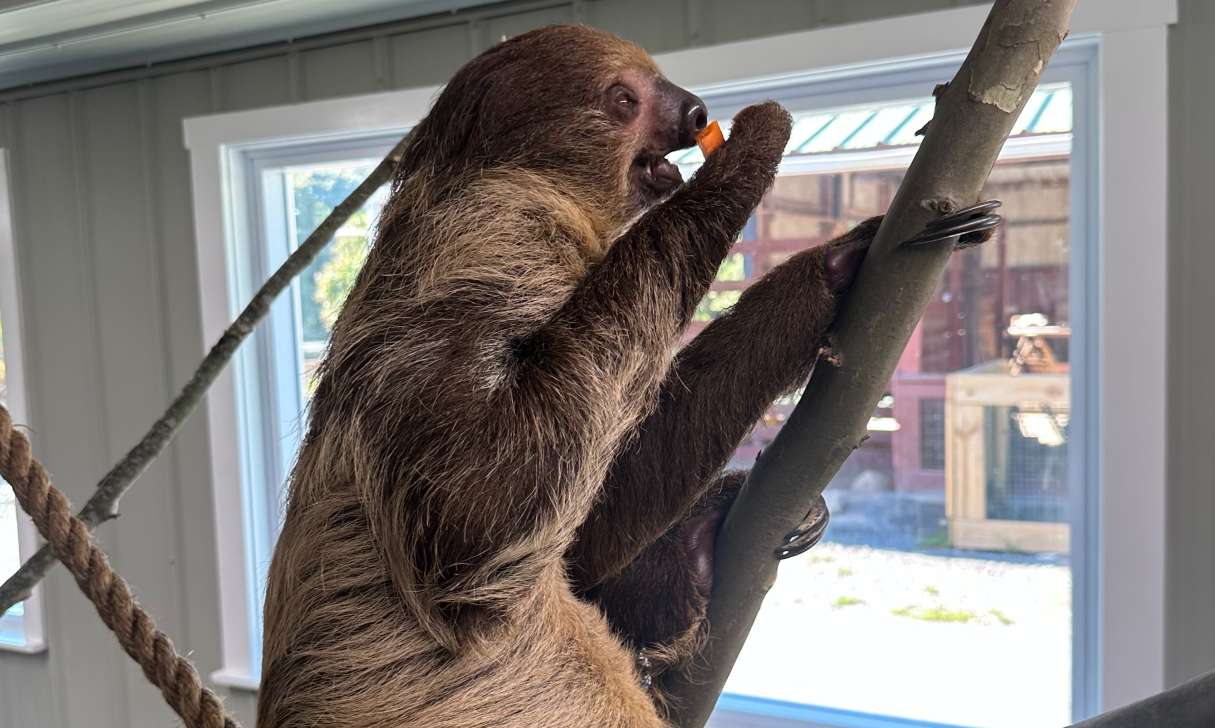
What has two toes and moves real slow?
NOVA Wild in Reston recently announced the arrival of two adorable two-toed sloths who are now ready to meet zoo-goers.
Two-toed sloths are native to Central and South America, including Brazil and Peru, according to the Smithsonian National Zoo’s website. And of course, they’re known for moving slowly.
“Sloths have leafy, low-calorie diets and very slow metabolisms to match. Their metabolic rate is only about 40-45% of what would be typical for their body weight,” the zoo writes. “Because of this specialized metabolism, sloths need to be frugal with their energy use. So, they move slowly and tend not to wander far from their small home ranges.”
“We’re just thrilled to welcome these captivating two-toed sloths,” NOVA Wild owner Tara Campbell Lussier said in a news release. “Sloths teach us valuable lessons – the importance of caring for the natural world, and to remember to slow down and enjoy life. They’re truly fascinating creatures and we’re grateful to share them with our guests and community.”
The sloths’ newly built, interactive habitat is designed to provide an immersive and educational experience, allowing guests to be up close and personal while learning about sloths’ natural habitat, behaviors and conservation status.
The sloths’ arrival is just in time for International Sloth Day, on Oct. 21.
For an extra $100 beyond admission, you can meet and interact with the new sloths one-on-one at Nova Wild through a zookeeper guided tour.
Located at 1228 Hunter Mill Road, Nova Wild opened in February as the newest iteration of Reston’s zoo, replacing the previous branding of Roer’s Zoofari after a change in ownership.
This article was written by FFXnow’s news partner InsideNoVa.com and republished with permission. Sign up for InsideNoVa.com’s free email subscription today.
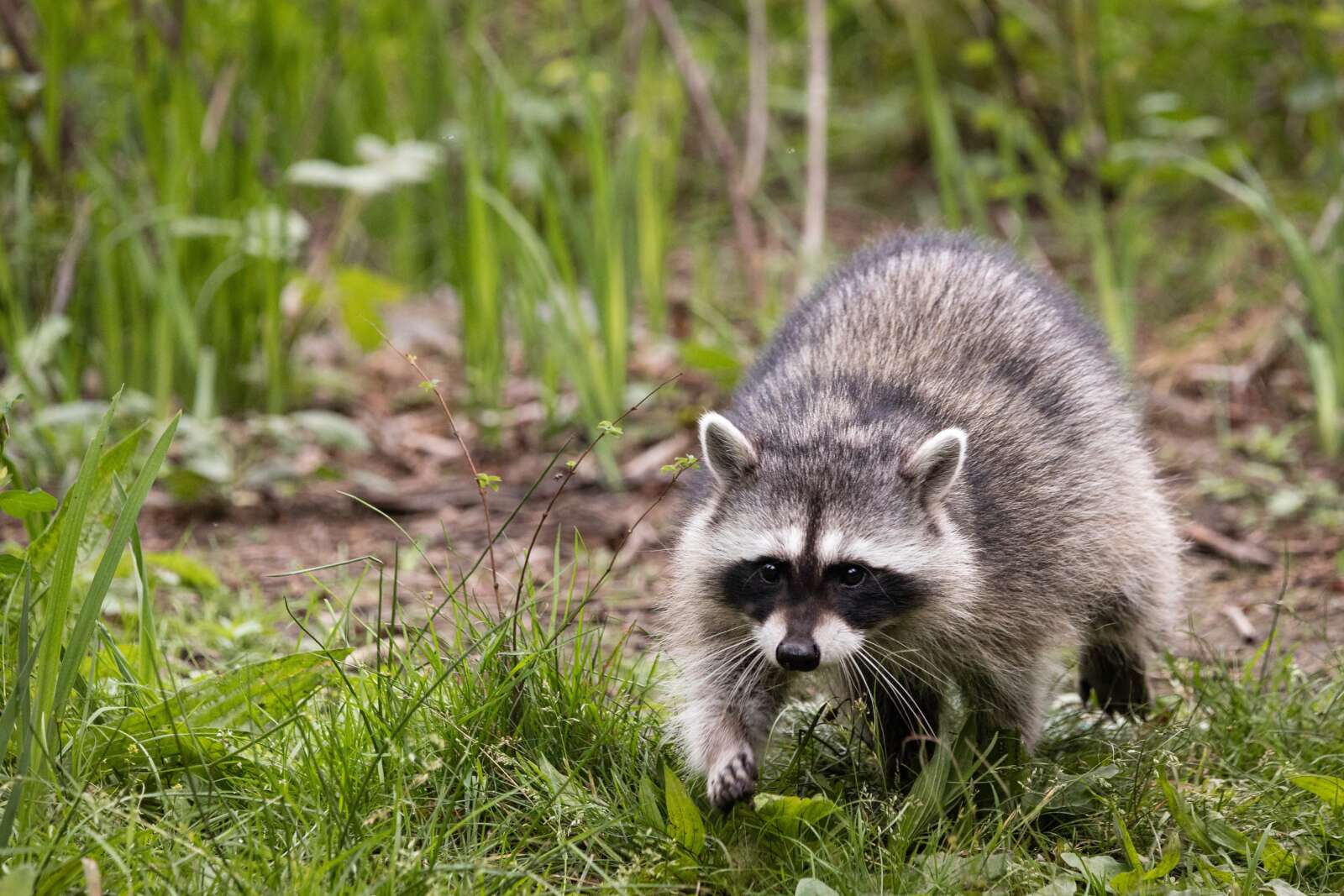
A raccoon struck by two different vehicles on Route 29 last weekend has tested positive for rabies, Falls Church City says.
The drivers hit the animal near the 500 block of S. Washington Street in the West Falls Church area on Saturday, Sept. 23, according to the city. The raccoon’s resulting injuries led Falls Church City police to euthanize it.
Before police arrived, however, at least two people came into contact with the animal.
“A witness stated that prior to officers arriving, both he and an unidentified driver came in direct contact with the injured raccoon while removing it from the roadway,” the city said in a news release.
The Fairfax County Health Department tested the raccoon for rabies and reported that it was positive on Tuesday (Sept. 26).
“The City of Falls Church Animal Control Officer and Fairfax County Health Department are seeking to identify the unknown driver (and any other individuals) who came in contact with the raccoon to clear them of rabies exposure,” Falls Church City said. “Please call the Fairfax County Health Department Rabies Program immediately at 703-246-2433 (TTY 711) if you believe that you were exposed.”
Falls Church says this is the first animal found within its city limits to test positive for rabies in 2023.
The Fairfax County Health Department typically identifies 40 to 60 rabies cases annually. Cases so far this year have included a raccoon that got attacked by a dog in Vienna and a skunk that chased, sprayed and bit hikers on the Bull Run Occoquan Trail in Clifton.
Rabies cases often increase in the spring, summer, and end of the fall, Fairfax County health officials previously told FFXnow.
“Rabies is a viral disease that people and pets can catch from infected animals through a bite, scratch, broken skin, and mucous membranes (eyes, nose, or mouth.),” Falls Church City said. “It is fatal if medical care is not given promptly.”
The city advises anyone who encounters sick, injured or aggressive wildlife that appear injured, sick, lethargic, disoriented, or aggressive to avoid it and call its non-emergency line at 703-241-5053.
In Fairfax County, community members can report incidents to the Animal Protection Police at 703-691-2131.
Photo via Pete Nuij/Unsplash

A green iguana is reportedly on the loose in Reston.
The reptile was spotted at Lake Newport around 4:30 p.m. on Monday (Sept. 11), according to Restonian Nicola Shelley.
“We did a double take because we couldn’t quite believe what we were seeing,” Shelley said.
She scoured NextDoor and community lost pet pages to determine if the creature was an escaped pet.
An animal protection officer says it’s likely the iguana was a pet or deliberately released by someone.
The animal was seen suspended in a tree over water, according to the Fairfax County Police Department.
“The animal is not inherently dangerous,” the FCPD wrote in a statement to FFXnow. “Due to the location of the iguana at the time of the call, no attempt to review the animal was made.”
The FCPD encourages residents to call the non-emergency number if they see the animal.
“I told my neighbors as it might give someone one heck of a surprise if they were out gardening and he was hiding in their yard. Poor guy!” Shelley said.
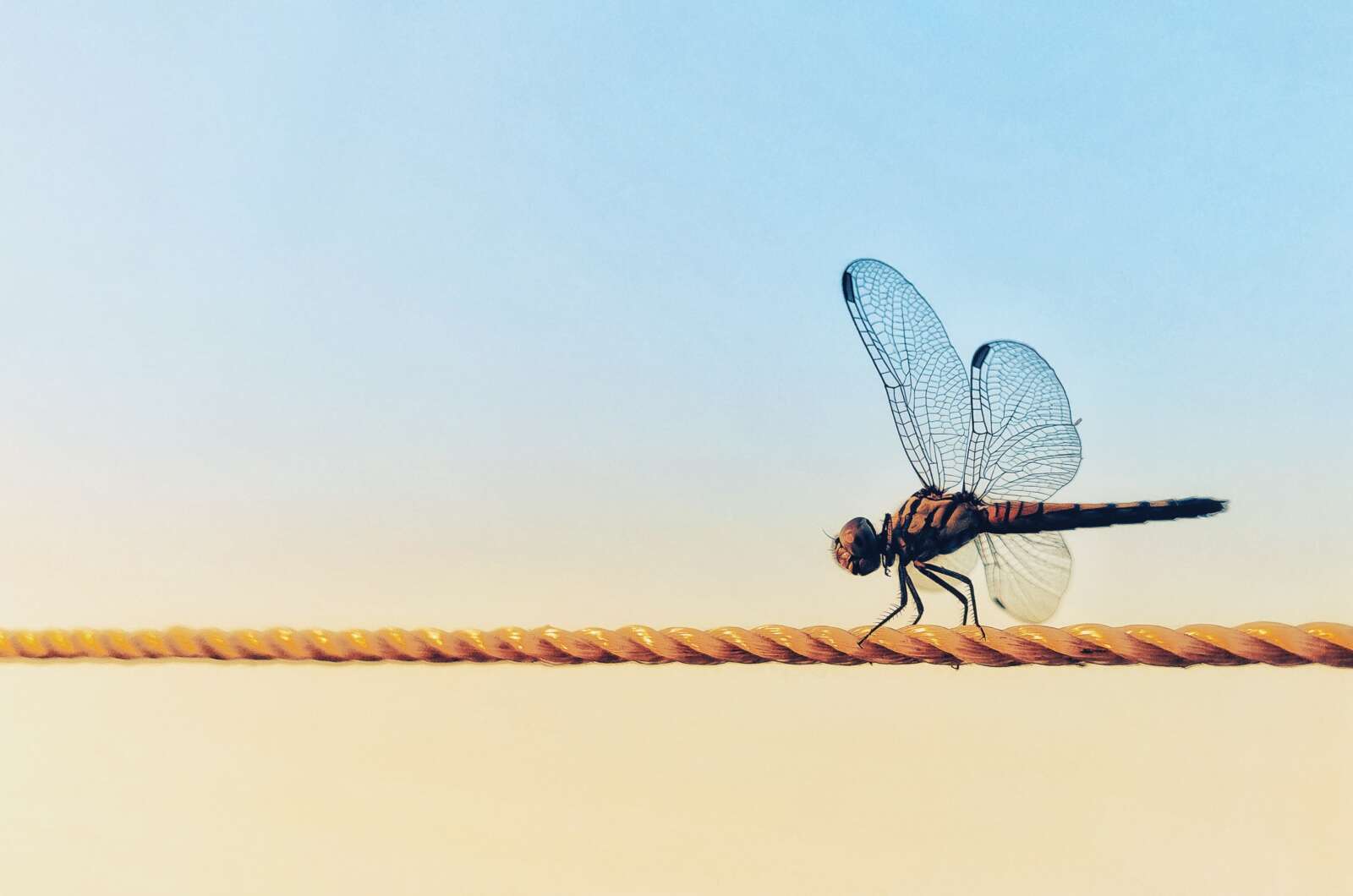
This year’s annual dragonfly count by Reston Association yielded higher than average numbers of the tiny critters.
Volunteer counters spotted 573 individual dragonflies from 16 species, the organization recently shared.
This is the first time the count tallied up more than 14 species since 2013, according to RA. Most of the dragonflies were called blue dashers, eastern amberwings and slaty skimmers. Some, like the dragonhunter, were seen for the first time since 2011.
But RA Chief Operating Officer Peter Lusk says that while the count was high, there was not a significant increase overall. Over the last 15 counts, there have been around 400 individual counts and 14 species, he said. There are 41 species of dragonfly in Reston.
“The number of species in Reston depends on many factors, including weather,” Lusk said by email. “The species identified this year indicates that despite a cool summer, Dragonfly numbers were not impacted, and our natural areas continue to support wildlife populations.”
The effort is led by staff and volunteers from the Walker Nature Center. Prior to the count, the center hosts a class to teach members about dragonflies.
Photo via Utsav Srestha/Unsplash
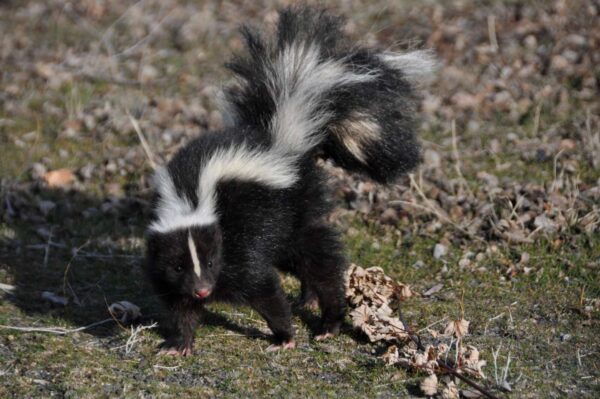
A rabid skunk was found on the Bull Run Occoquan Trail on Saturday, June 10, the Fairfax County Health Department confirmed today (Tuesday).
The skunk reportedly chased, sprayed and bit multiple hikers before it was found near Balmoral Terrace and Cannon Fort Drive in Clifton. Health officials advise that it may have had contact with other people or pets during the time that it was sick.
The skunk was described as an adult largely black animal with a large white stripe covering most of its back. It was reported several times between 7 a.m. and 2 p.m. before it was captured by Animal Protection Police.
Rabies can infect wildlife — especially foxes, raccoons, skunk, bats and domestic animals. People get rabies when they are bitten or scratched by an animal infected by it.
To date, 10 animals have been diagnosed with rabies in the county this year, including a raccoon that was bitten by a dog in Vienna last month.
Here’s more from the health department on what to look out for:
Animals with rabies may act normally during the early stages of the disease, making it difficult to know if the animal is infected. As the disease progresses, animals often show changes in behavior. For example, wild animals may act very docile and domestic animals may become aggressive. Rabid animals may stagger, drool, or become paralyzed. Protect yourself and your family from rabies: stay away from wild animals and be sure pets are vaccinated against rabies every year. Remember, if the animal is not your own, leave it alone!
If bitten or scratched by an animal that might have rabies, wash the wound thoroughly with soap and water and seek medical attention right away. When vaccinations are provided in time and appropriately, rabies treatment is 100 percent effective in preventing the disease. But if not treated, rabies is 100 percent fatal.
If anyone was bitten or scratched by the animal on or around June 10, county health officials urge individuals to call the Fairfax County Health Department Rabies Program at 703-246-2433, extension 711.
Photo via Bryan Padron/Unsplash

